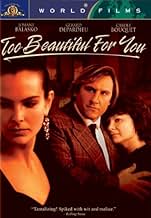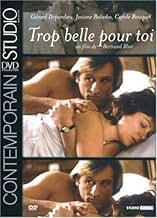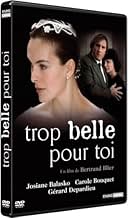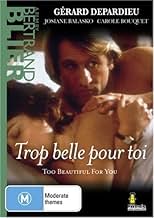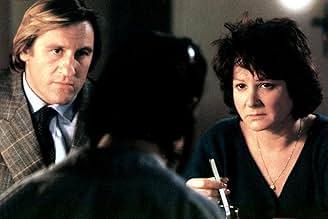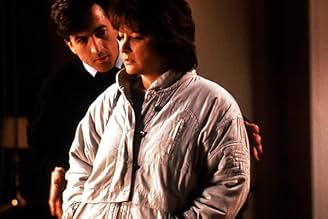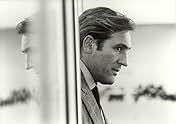Trop belle pour toi
- 1989
- Tous publics
- 1h 31m
IMDb RATING
6.6/10
3.2K
YOUR RATING
A sharp love triangle is formed by a wealthy businessman.A sharp love triangle is formed by a wealthy businessman.A sharp love triangle is formed by a wealthy businessman.
- Awards
- 6 wins & 7 nominations total
Gérard Depardieu
- Bernard Barthélémy
- (as Gerard Depardieu)
Catherine Gillet
- La femme du train
- (uncredited)
Sylvie Orcier
- Marie-Catherine
- (uncredited)
- Director
- Writer
- All cast & crew
- Production, box office & more at IMDbPro
Featured reviews
The few reviews here indicate that this is a film which provokes in some boredom and confusion, while other will find it provocative and daring in its originality. Maltin gives it a two-star rating and says "after a bright beginning, it goes absolutely nowhere." I was prepared to abandon the film after 15 minutes or so, but the absolutely gorgeous Schubert melodies that pervade the score and tie it all together....they kept me going with the film, and the fantastic photography, acting, and plot twists sustained my interest to the end.
Yes, the approach is surreal and the story-telling non-linear. Much of the dialog is brilliant, but it soon became obvious (to me, anyway) that these people are not actually saying these things to one another ... and what an interesting world it would be if we could say aloud all the things that we deeply feel! I cannot pretend to have understood it all, but the film had an intellectual appeal and, to repeat an earlier point, a ravishing score of Schubert pieces which adorn the film like precious jewels.
Yes, the approach is surreal and the story-telling non-linear. Much of the dialog is brilliant, but it soon became obvious (to me, anyway) that these people are not actually saying these things to one another ... and what an interesting world it would be if we could say aloud all the things that we deeply feel! I cannot pretend to have understood it all, but the film had an intellectual appeal and, to repeat an earlier point, a ravishing score of Schubert pieces which adorn the film like precious jewels.
Bertrand Blier is the French Pedro Almodovar: cynical and shocking. Either you love, either you hate his movies. Some of them have divided French public due to their shocking contents, notably "Les Valseuses" (1974). "Trop belle pour toi" appears like an exception in his work. It means that taste of Blier for provocation is less pronounced. However, it doesn't make the movie better for all that. It doesn't work for several reasons:
first, it's hard to follow the plot because Blier introduces sequences that are earlier or subsequent to the present scene. For example, we realize too late that Colette ( Balasko) after she left Bernard, married with a man and she had children. The movie ignores certain sequences that are however essential to the development of the plot.
Then, the movie irritates due to its main characters, it goes without saying that dialogs are the key to the good development of the plot. But here, you are under the impression that the characters don't exchange their words. They're talking in the emptiness and don't seem to care about the others' opinion!
Let's add that the movie, sometimes, creates a certain boredom because of some lifeless sequences that drag on (notably during dinners in Depardieu's ravishing house with his wife ( Bouquet) and all their guests.
In short, "trop belle pour toi" is a cold and no soul movie and it left me unsatisfied in spite of good ideas in the making ( Cluzet who expresses his anger with Schubert's music in the background played very loud). Even a trio of outstanding actors don't succeed in saving the movie.
Remark: Carole Bouquet won an Oscar in France in 1990, for her performance in this movie. Good for her.
first, it's hard to follow the plot because Blier introduces sequences that are earlier or subsequent to the present scene. For example, we realize too late that Colette ( Balasko) after she left Bernard, married with a man and she had children. The movie ignores certain sequences that are however essential to the development of the plot.
Then, the movie irritates due to its main characters, it goes without saying that dialogs are the key to the good development of the plot. But here, you are under the impression that the characters don't exchange their words. They're talking in the emptiness and don't seem to care about the others' opinion!
Let's add that the movie, sometimes, creates a certain boredom because of some lifeless sequences that drag on (notably during dinners in Depardieu's ravishing house with his wife ( Bouquet) and all their guests.
In short, "trop belle pour toi" is a cold and no soul movie and it left me unsatisfied in spite of good ideas in the making ( Cluzet who expresses his anger with Schubert's music in the background played very loud). Even a trio of outstanding actors don't succeed in saving the movie.
Remark: Carole Bouquet won an Oscar in France in 1990, for her performance in this movie. Good for her.
"Elle est trop belle" is a romantic drama overflowing with a refined yet vulgar sensuality that is common in French films. Sexuality, lust, infidelity are the main themes of the film, and are lusciously exhibited on screen. Choice of music was excellent, with Schubert in the background providing beauty and consolation in midst of heightened drama. You have fancy dinners, spacious mansions and country homes. Certainly men of culture will appreciate this film.
Acting in scenes was mostly naturalistic and plain, though not completely without emotion. Overall tempo of the movie was slow and relaxed, taking plenty of time to establish scenes and characters. Sometimes even bordering on boredom. Focus was not purely based on intense emotions of infatuation and cliched notions of romanticism, but the human relationships between the characters.
The unoriginality of the subject matter and the lack of subversiveness in the message, however, dims the glow of its achievements. The sudden middle-life crisis and the marital unhappiness of a well-to-do middle class couple has been well documented in the history of film, and there have been better portrayals of it. The movie is heavy-handed with its message of internal and external beauty.
There might have been some critique of the boredom of the perfect bourgeoisie life, but it is soo brief, indirect and inconsequential you could easily miss it. It seems the down-to-earth nature and vividness of Colette is contrasted with the icy and cold demeanor of the proper Florence, and the white spacious family home with the small run-down motel.
In the end, the story felt quite simple and predictable, even cliched. While watching it for the first time was a pleasant experience, there is probably little one can gain from rewatching the film. Overall, it is a decent film, doing its job well, but nothing out of the ordinary. Though I do admire the movie in other respects, the script just doesn't make it.
Acting in scenes was mostly naturalistic and plain, though not completely without emotion. Overall tempo of the movie was slow and relaxed, taking plenty of time to establish scenes and characters. Sometimes even bordering on boredom. Focus was not purely based on intense emotions of infatuation and cliched notions of romanticism, but the human relationships between the characters.
The unoriginality of the subject matter and the lack of subversiveness in the message, however, dims the glow of its achievements. The sudden middle-life crisis and the marital unhappiness of a well-to-do middle class couple has been well documented in the history of film, and there have been better portrayals of it. The movie is heavy-handed with its message of internal and external beauty.
There might have been some critique of the boredom of the perfect bourgeoisie life, but it is soo brief, indirect and inconsequential you could easily miss it. It seems the down-to-earth nature and vividness of Colette is contrasted with the icy and cold demeanor of the proper Florence, and the white spacious family home with the small run-down motel.
In the end, the story felt quite simple and predictable, even cliched. While watching it for the first time was a pleasant experience, there is probably little one can gain from rewatching the film. Overall, it is a decent film, doing its job well, but nothing out of the ordinary. Though I do admire the movie in other respects, the script just doesn't make it.
Bertrand Blier's story of love at first sight between a successful auto salesman and his older, unglamorous secretary does more than simply dispel the skin-deep myth of physical beauty. Gérard Depardieu describes his new lover as "not beautiful, but nice", but his aristocratic young wife dismisses her for being 'common', setting up a conflict not between age and beauty but between opposing social classes, with a proletarian lug who married into the upper crust becoming justifiably mushy over someone less pretentious than his wife. It sounds like fun, but anyone expecting a lightweight romantic farce will be disappointed to find something closer to an intellectual exercise in style, designed around an exaggerated sense of melodrama and several odd, operatic gestures: characters thinking out loud in public or engaging in third-person soliloquies, and so forth. Not to mention, in an obscure ongoing joke, a few outspoken criticisms of the music of Franz Schubert.
10Honkon
Very few directors are prepared to take the sort of liberties Blier does, both in terms of subject matter and the manner of telling the story. "Trop Belle Pour Toi" is perhaps his most accessible film, telling the story of a successful man with a beautiful wife who unaccountably falls in love with his dumpy secretary. Depardieu is wonderful in this, utterly bewildered by his predicament, and the noted comedienne Balasko is radiant as a woman in love.
The style is almost cubist, the celebrated "beginning middle and end but not necessarily in that order", and alternative storylines are proposed and discarded at whim, to the evident confusion of some viewers. Blier has often gone all out to shock but that's less evident here, however his audacious humour remains intact. Not one for the viewer who likes to sit back and be told a straight story but for the rest of us, a joy from start to finish.
The style is almost cubist, the celebrated "beginning middle and end but not necessarily in that order", and alternative storylines are proposed and discarded at whim, to the evident confusion of some viewers. Blier has often gone all out to shock but that's less evident here, however his audacious humour remains intact. Not one for the viewer who likes to sit back and be told a straight story but for the rest of us, a joy from start to finish.
Did you know
- TriviaIn the documentary Blier, Leconte, Tavernier: trois vies de cinéma (2020), Blier says it was hell to shoot.
- Quotes
Colette Chevassu: Beauty hurts.
- SoundtracksImpromptu Opus 90 No 2
Music by Franz Schubert
Piano: Odette Gartenlaub
édition CINE VALSE - D.D. PRODUCTIONS - ORLY FILMS -S.E.D.I.F.
- How long is Too Beautiful for You?Powered by Alexa
Details
Box office
- Gross US & Canada
- $1,776,440
- Opening weekend US & Canada
- $31,208
- Mar 4, 1990
- Gross worldwide
- $1,776,440
- Runtime
- 1h 31m(91 min)
- Sound mix
- Aspect ratio
- 2.35 : 1
Contribute to this page
Suggest an edit or add missing content

